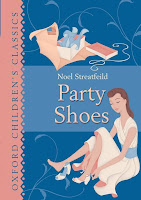 |
| (Amazon UK link) |
The story is about the Andrews family, and is set in 1945, towards the end of World War II. Dr Andrews is a hard-working GP, comfortably off (his oldest son goes to a boarding school) but not wealthy. This is in part because he has six children and is also bringing up his niece Selina, whose parents are prisoners in Hong Kong. His wife is a traditional housewife and mother who sometimes helps in his surgery.
The story opens when a parcel arrives for Selina, from her godmother in America. Dr Andrews has to pay an astonishingly high amount for customs duty: nearly four pounds, which Google tells me would be worth about two hundred pounds in today’s money. I wondered whether the amount was changed in the 2002 edition which I was reading, but apparently not.
Selina’s dress is gorgeous, with matching shoes and ribbons but she can’t think of anywhere that she might be able to wear it. So the family have a brainstorming session, and decide on an ambitious project: they will write and perform a pageant, hopefully in the grounds of a nearby converted abbey which is due to be sold in the next six months or so.
Each of the four older children (John, Sally, Christopher and Phoebe) plan to write a scene, with parts for their much younger brothers Augustus and Benjamin. Selina will be the prologue and epilogue, introducing the pageant from the point of view of the spirit of England. And while it all sounds rather unlikely, things come together, the adults they speak to are supportive, and scenes are written
I like the fact that none of the children is overly brilliant, although they’re all interesting characters. Noel Streatfeild had quite a talent for making realistic children, if a tad caricatured here and there. Sally is the dancer of the family, but although she’s good, she’s not considered outstanding. And she’s a nice, thoughtful child. Phoebe is the most arrogant, and also the cleverest and the best actress, but she’s also quite stubborn.
Philip, the son of the owners of the abbey has been invalided from the war, and is talented at theatrical production. So he gets involved, and the small family-run affair gets larger and larger. I thought Philip was very well-written; he has excellent ideas, if a bit overpowering at times, but also has to learn to defer to the children as it was their idea.
I had remembered the overall storyline, and one significant misunderstanding that’s sorted out towards the end of the book. But I had entirely forgotten the details, and how everything started to come together despite interruptions, unexpected problems, and even a potential (and unexpected) disaster. Noel Streatfield wrote the book in 1946, so it’s full of historical background, as the war comes to a close and the village celebrates. But we see many of the problems that were common then such as ongoing food rationing, and the lack of possible material to buy for costumes.
The production of the pageant feels realistic, probably because Noel Streatfeild herself worked for ten years in a theatre. And although Selina is really the main character, there is plenty that could appeal to boys as well as girls in this novel which was probably intended for children of around nine to twelve. Selina, Sally and Christopher are all twelve, and Phoebe is nine-and-a-half. The children all have a lot of independence, as was normal in the second half of the 1940s and are quite resourceful.
Naturally a book like this, nearly eighty years old, has a somewhat dated feel to it as it was written as contemporary rather than historical fiction. But I love the way that books of this era can be nostalgic as well as giving a broad understanding of the social norms of the times. And I found that I thoroughly enjoyed re-reading ‘Party Shoes’. One chapter was very poignant, some were light-hearted, and the whole was an encouraging testament to determination and family loyalty. I even liked the ending; sometimes Noel Streatfeild’s books finish rather abruptly, but this one tied up its loose ends, and felt entirely satisfactory.
Recommended to older children who like this kind of story, or of course to adults who recall this kind of fiction from their youth.
Review copyright 2023 Sue's Book Reviews
No comments:
Post a Comment